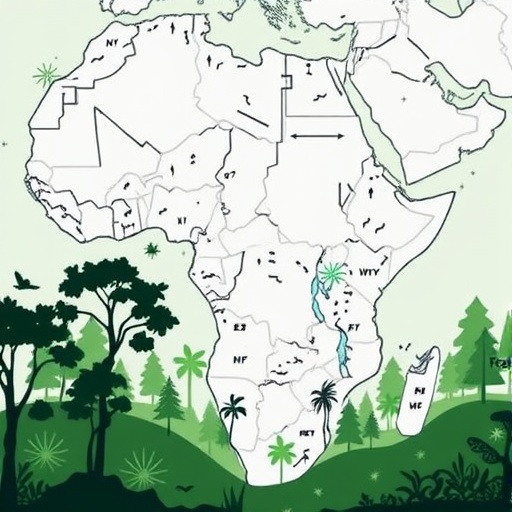In a groundbreaking study, researcher E. Guiatin has delved deep into the intricate dynamics of forest ecosystems in West Africa, focusing on both common and specific driving factors that contribute to their evolution. The findings, published in the inaugural issue of Discover Forestry, illuminate the many challenges that these ecosystems face, including anthropogenic influences, climate variability, and biodiversity loss. With a current trend of increased deforestation and environmental degradation in the region, understanding these dynamics is more crucial than ever.
The study uses a multi-faceted comparative analysis, leveraging a variety of data sources and methodologies to paint a comprehensive picture of the driving forces behind forest dynamics. Guiatin emphasizes that while there are universal factors that apply across different ecosystems, certain local conditions and historical contexts play significant roles in shaping the behavior and resilience of forest systems. By examining these factors, Guiatin hopes to inform conservation strategies and policy formulations that are both effective and context-specific.
Among the common driving factors identified, climate change stands out prominently. Changes in rainfall patterns, temperature increases, and extreme weather events have profound effects on the health and diversity of forest ecosystems. West Africa, characterized by its unique climatic zones, is particularly vulnerable to these alterations. Guiatin’s analysis highlights how shifting climate conditions not only affect tree growth and species distribution but also the ecosystem services that local communities rely on.
In addition to climate change, the study emphasizes the compounding effects of human activity. Agricultural expansion, urbanization, and illegal logging are systemic issues that further exacerbate the pressures on forest ecosystems. The author notes that these activities not only diminish forest cover but also fragment habitats, leading to loss of biodiversity. The implications of such actions extend beyond the immediate environment, affecting air quality, water cycles, and local economies.
One of the unique aspects of Guiatin’s research is the consideration of specific historical and socio-economic factors that influence forest dynamics in different regions of West Africa. For instance, colonial history has left a lasting impact on land use practices and governance systems that still persist today. Understanding the legacy of these historical factors is essential for developing effective policy interventions that are tailored to local needs and realities.
The use of advanced modeling techniques and remote sensing technologies is another highlight of Guiatin’s investigations. By integrating satellite imagery with ground-based studies, the research provides a clearer view of forest changes over time. This methodological innovation not only enhances the accuracy of the findings but also demonstrates the potential of technology in addressing environmental challenges. The results presented in the paper can serve as a vital tool for stakeholders and policymakers in devising strategies to mitigate adverse impacts on forest ecosystems.
Guiatin’s work also raises critical questions about the role of indigenous knowledge in forest conservation. Local communities possess a wealth of understanding regarding their natural environments, yet this knowledge is often overlooked in formal conservation planning. Incorporating indigenous perspectives can lead to more sustainable practices and policies that resonate with the communities reliant on these ecosystems for their livelihoods.
The study makes a strong case for collaborative efforts among various stakeholders, including governments, non-governmental organizations, and community groups. By fostering partnerships aimed at sustainable forest management, it is possible to align economic development goals with conservation objectives. Such collaborations could lead to initiatives that not only benefit forest ecosystems but also enhance the well-being of local populations.
In the face of mounting environmental threats, Guiatin’s research advocates for a proactive approach to forest management in West Africa. The paper posits that understanding the multifaceted driving factors behind ecosystem dynamics is pivotal in developing a resilience framework. This framework would allow forests to adapt and thrive, even under adverse conditions brought about by global changes.
Overall, the findings of this comprehensive study underscore the urgent need for sustained research and dialogue on forest ecosystems in West Africa. Climate change, human activity, historical context, and indigenous knowledge are all intertwined in a complex web that requires nuanced understanding and action. Policymakers and stakeholders in the region are called upon to heed these insights as they plan for a sustainable future.
Guiatin’s work contributes significantly to the growing body of literature that seeks to elucidate the complexities of ecological systems in the face of change. It challenges conventional wisdom and calls for a rethinking of approaches to forest conservation that prioritize local knowledge and adaptive management. With the stakes higher than ever, the implications of this research extend far beyond the boundaries of West Africa, resonating on a global scale.
As the world grapples with environmental changes, Guiatin’s research offers valuable lessons on the importance of understanding local ecosystems and crafting targeted interventions that reflect the unique dynamics at play. The future of forest ecosystems in West Africa will depend heavily on how strategically and collaboratively these insights are translated into action.
In summary, E. Guiatin’s comparative analysis comes at a crucial juncture in the fight against environmental degradation. By highlighting both common and specific factors that influence forest dynamics, the research sets the stage for informed action geared towards sustainability. The urgency for effective forest management strategies has never been clearer, and the insights gleaned from this study provide a robust foundation for future discussions.
Subject of Research: Comparative analysis of common and specific driving factors of forest ecosystem dynamics in West Africa.
Article Title: Comparative analysis of common and specific driving factors of forest ecosystem dynamics in West Africa.
Article References:
Guiatin, E. Comparative analysis of common and specific driving factors of forest ecosystem dynamics in West Africa.
Discov. For. 1, 36 (2025). https://doi.org/10.1007/s44415-025-00034-z
Image Credits: AI Generated
DOI: 10.1007/s44415-025-00034-z
Keywords: Forest ecosystems, West Africa, climate change, biodiversity, human activity, indigenous knowledge, sustainable management, ecological dynamics.




